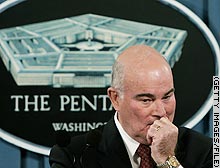|
|
Home | World | U.S. | Weather | Business | Sports | Analysis | Politics | Law | Tech | Science | Health | Entertainment | Offbeat | Travel | Education | Specials | Autos | I-Reports |
|
|
|
Home | World | U.S. | Weather | Business | Sports | Analysis | Politics | Law | Tech | Science | Health | Entertainment | Offbeat | Travel | Education | Specials | Autos | I-Reports |
|
Story Highlights• Memo shows Army knew five months ago of Walter Reed problems• Army announces new commander for Walter Reed hospital • Army secretary's resignation announced a day after hospital commander fired • Army has been criticized for poor treatment of wounded veterans Adjust font size:
WASHINGTON (CNN) -- Secretary of the Army Francis Harvey resigned Friday in the wake of recent reports of substandard conditions at Walter Reed Army Medical Center, a key facility treating troops wounded in Iraq. Defense Secretary Robert Gates announced Harvey's resignation at the Pentagon, just a day after Harvey removed the hospital's commander, Maj. Gen. George Weightman, from his post. Gates said Undersecretary of the Army Peter Geren will temporarily take Harvey's place. Harvey will leave on March 9. "I thanked Dr. Harvey for his distinguished service to the department and to the nation," Gates said. "This flagship institution must have its new leadership in place as quickly as possible." The Army later said Maj. Gen. Eric B. Schoomaker will take command of Walter Reed and the North Atlantic Regional Medical Command. Schoomaker now commands the U.S. Army Medical Research and Material Command at Fort Detrick, Maryland. Gates accepted no questions after his announcement, and didn't explain why Harvey resigned. However, he repeated something the Army said Thursday when Weightman was fired: The problems at the hospital reflect a lack of leadership. "I am disappointed that some in the Army have not adequately appreciated the seriousness of the situation pertinent to outpatient care at Walter Reed. Some have shown too much defensiveness, and have not shown enough focus on digging into and addressing the problems." Gates praised the doctors and other medical personnel at Walter Reed, and said they deserve support. Troops recuperating from wounds they suffered in Iraq and Afghanistan were discovered to be living in substandard conditions in Building 18, an adjunct structure at Walter Reed that was once a hotel. There also were complaints of too much bureaucratic red tape. Weightman, the fired commander, had said he was unaware of the substandard conditions. But in a memo signed by a deputy to Weightman in September 2006, five months before reports of the problems at Walter Reed came to light, concerns were raised about care at the facility after the Army's decision to privatize support services there. The memo obtained by the House Oversight and Government Reform Committee says Walter Reed "operations and patient care services are at risk of mission failure." Harvey had been the Army's top civilian official since November 2004. Before President Bush appointed him to the position, he spent much of his career working for defense contractors, according his Army biography. Earlier Friday, Bush said he is "deeply troubled" by the reports from Walter Reed and will form a bipartisan panel to assess medical care for wounded U.S. service members. "This review will examine their treatment from the time they leave the battlefield through their return to civilian life as veterans, so we can ensure that we are meeting their physical and mental health needs," Bush will say in his weekly radio address, which is to air Saturday. A transcript was released by the White House on Friday. He says he will soon announce commission members and set a deadline for their recommendations. "Most of the people working at Walter Reed are dedicated professionals," Bush will say. (Watch as Bush describes an unacceptable situation "Yet some of our troops at Walter Reed have experienced bureaucratic delays and living conditions that are less than they deserve. This is unacceptable to me, it is unacceptable to our country, and it's not going to continue." The president said steps are being taken to find out whether there are similar problems at other military and veterans hospitals. Bush said he is asking Congress for more than $86 billion for veterans' services for fiscal year 2008. If approved, "we will have increased the VA's health-care budget by 83 percent over the past six years, from about $20 billion to more than $36 billion."  Secretary of the Army Francis Harvey holds a media briefing at the Pentagon in January 2006. |